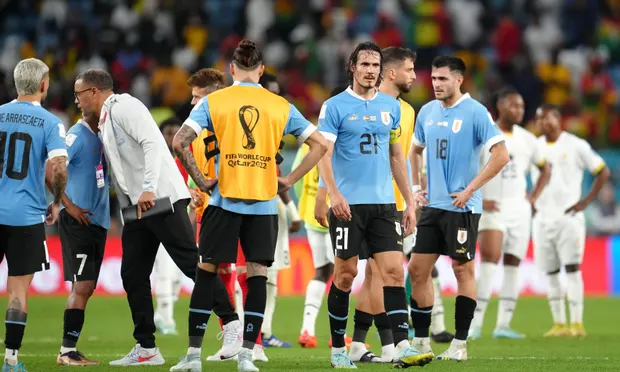Uruguay beat Ghana but are knocked out of World Cup on goals scored
Job Overview
There are no winners in revenge missions. Sentiment demanded that Ghana should right the wrongs of the 2010 World Cup quarter-final against Uruguay and expiate the hurt of Luis Suárez’s last-minute handball on the line. But Uruguay, and Suárez in particular, have no time for such romantic notions of redemption. Ghana were again eliminated after missing a penalty but their only consolation was that, although Suárez set up two, it was South Korea who went through to the last 16 with Portugal.
It was a game haunted by the memory of events at Soccer City 12 years ago, and specifically by that one moment in the final minute of extra time. The image was always there, a perverse footballing pietà, flitting in the peripheral vision: Stephen Appiah in the foreground having had the initial blocked effort (which was probably offside, although nobody talks about that), John Mensah and the goalkeeper Fernando Muslera falling together with Andrés Scotti, Dominic Adiyah stretching having headed the loose ball goalwards, Diego Fucile with back arched and left fist thrust up having missed his attempt to handle, and Suárez, arms out, leaping to his right to claw the ball away. It is the Pisgah of African football, the moment when it saw the promised land of a World Cup semi-final, but was denied
Billboards across Accra this week have depicted the incident with the slogan: “REVENGE!: Let’s support the Black Stars.” The fact that Ghanaians still feel the pain of that moment acutely was made clear by the pre-match press-conference. Suárez, with a characteristic sense of provocative showmanship, appeared alone and seemed entirely unfazed by a Ghanaian journalist saying that many in his country saw him as “the devil himself” (adding “el diablo”, lest there be any confusion) and wanted to “retire” him.
He didn’t regret it, he said. He had been punished. He had been shown a red card and missed the semi-final as a result. It wasn’t his fault Asamoah Gyan had missed the penalty.
Was this an elaborate wind-up? Suárez had played just 81 minutes in the group stage and had been distinctly unimpressive, managing just one shot on goal (off target). But if this was one enormous mind-game Uruguay carried it to the extreme, naming Suárez as captain. Was that in the mind of André Ayew, the only Ghana player at Al Janoub to have been in the 2010 quarter-final, as he stepped up to take a penalty?
Uruguay go out of World Cup 2022 despite 2-0 win over Ghana – live!
For, of course there was a penalty, and of course it was laced with controversy. How could it not be? And for added narrative value, it came for an incident in the 18th minute – 18 being the shirt number worn by Adiyah.
Sergio Rochet, the Uruguay keeper, clearly tripped Mohammed Kudus but initially Ayew was ruled offside. When VAR proved he had been played fractionally onside by the heel of Matthias Olivera, the penalty award was automatic. Ayew’s kick, though, was dismal and easily saved by Rochet.
There was further VAR penalty controversy just before the hour as Darwin Núñez went down under a challenge from Daniel Amartey. The idiosyncratic German referee Daniel Siebert didn’t give it, was told to consult the screen and, unusually, decided not to overturn the decision, signalling he had seen a slight touch on the ball.
It was a decision that proved vital for Uruguay’s goal difference; had that been given and converted, they would have gone through rather than South Korea.




